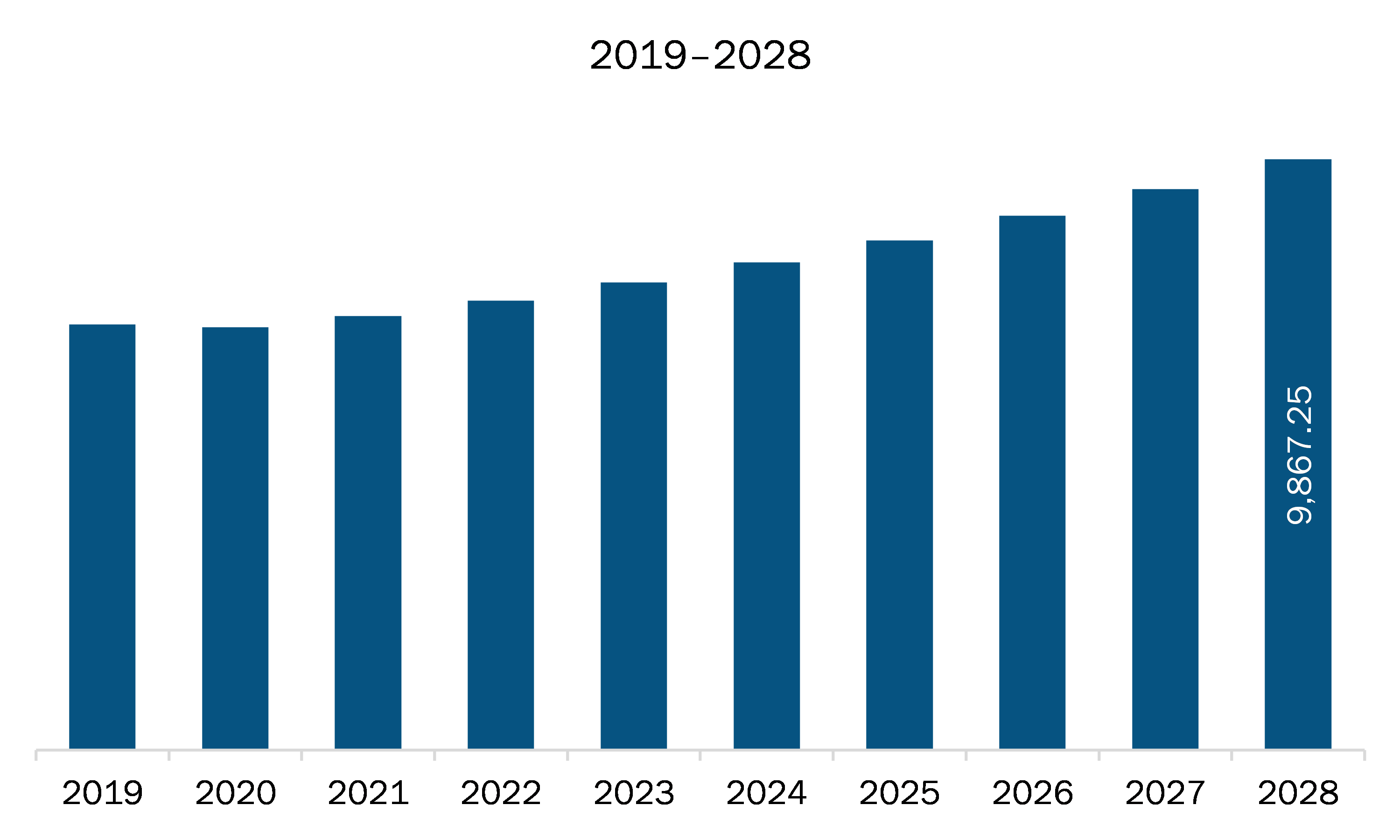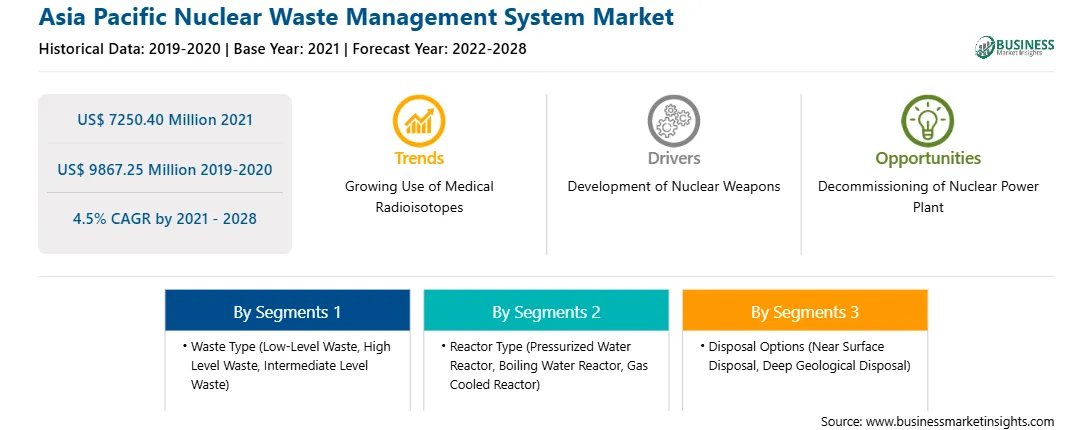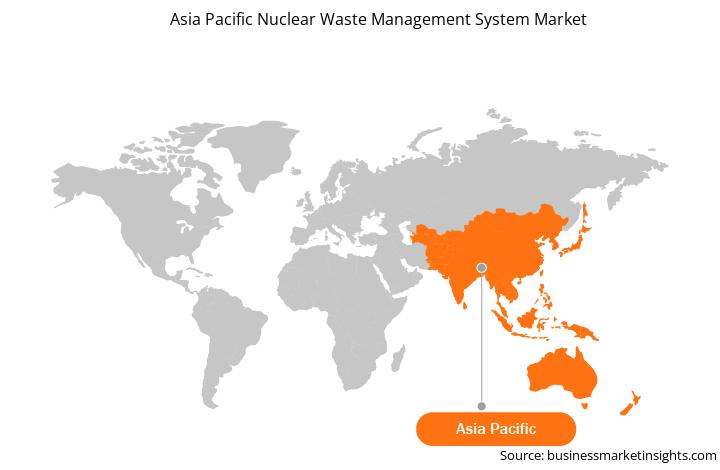The nuclear waste management systems market in APAC is further segmented into China, Japan, India, Australia, South Korea, and the Rest of APAC. The region is characterized large youth population, vast industrialization, and growing urbanization, coupled emerging economies such as China, India, South Korea, Vietnam, and Thailand. Moreover, APAC is highly inclined toward clean energy sources, which is subsequently projected to generate demand for nuclear waste management systems in the coming years. The region in contrast with Europe and North America, where the demand for energy from nuclear power has been limited for several years, many economies in APAC are planning and building new nuclear power reactors to meet the increasing energy demand. The region has ~135 active nuclear reactors engaged in generation of electricity, ~30–35 nuclear reactors under construction, and plans of building additional 50–60 nuclear reactors in future. China is currently leading the in the region in terms of nuclear energy, followed by India, Japan, and South Korea. Increasing demand for energy, coupled with growing concerns regarding curtailing carbon emissions, is majorly driving the deployment of nuclear power plants; however, decreasing prices of renewable energy restraining for the adoption of nuclear power, thereby affecting the nuclear waste management system market growth. Furthermore, governments in APAC have imposed various containment measures such as lockdowns, travel restriction, workforce limitations at workplaces, and so on, to contain the spread of COVID-19. Amid these conditions, the nuclear waste management system market players experienced marginal decline in revenues in 2020; however, the market is likely to gain traction in 2021.
Due to the massive number of COVID-19 confirmed cases in China and India, APAC is adversely affected by the COVID-19 outbreak pandemic. China homes the largest population across the world, which is imposing greater risk of infection to many individuals. China is also a world leader of many global brands. According to the Organization for Economic Co-operation and Development (OECD), the pandemic has negatively affected major economies of the region, such as China, India, South Korea, and Vietnam. The APAC nuclear waste management system market experienced a downward industrial growth during the first two quarters of 2020. Unlike North America and most of Western Europe, where development in electricity generating capacity, notably nuclear power, has been restricted for many years, several Asian countries are planning and building new nuclear power reactors to meet the growing demand for clean electricity. Approximately two-thirds of the reactors under development in the world are in Asia. China is making rapid progress in the construction of new nuclear power plants. The units that are currently being built are a combination of local and Western designs. Between December 2010 and December 2020, most new nuclear power plants were built in China (36), where nuclear power generation surged by 400% in ten years. The increase in need of clean energy produced from nuclear power plants has continued during the pandemic, and it would see a significant rise in the coming years.

Strategic insights for the Asia Pacific Nuclear Waste Management System provides data-driven analysis of the industry landscape, including current trends, key players, and regional nuances. These insights offer actionable recommendations, enabling readers to differentiate themselves from competitors by identifying untapped segments or developing unique value propositions. Leveraging data analytics, these insights help industry players anticipate the market shifts, whether investors, manufacturers, or other stakeholders. A future-oriented perspective is essential, helping stakeholders anticipate market shifts and position themselves for long-term success in this dynamic region. Ultimately, effective strategic insights empower readers to make informed decisions that drive profitability and achieve their business objectives within the market.

| Report Attribute | Details |
|---|---|
| Market size in 2021 | US$ 7250.40 Million |
| Market Size by 2028 | US$ 9867.25 Million |
| Global CAGR (2021 - 2028) | 4.5% |
| Historical Data | 2019-2020 |
| Forecast period | 2022-2028 |
| Segments Covered |
By Waste Type
|
| Regions and Countries Covered | Asia-Pacific
|
| Market leaders and key company profiles |
The geographic scope of the Asia Pacific Nuclear Waste Management System refers to the specific areas in which a business operates and competes. Understanding local distinctions, such as diverse consumer preferences (e.g., demand for specific plug types or battery backup durations), varying economic conditions, and regulatory environments, is crucial for tailoring strategies to specific markets. Businesses can expand their reach by identifying underserved areas or adapting their offerings to meet local demands. A clear market focus allows for more effective resource allocation, targeted marketing campaigns, and better positioning against local competitors, ultimately driving growth in those targeted areas.

The nuclear waste management system market in APAC is expected to grow from US$ 7250.40 million in 2021 to US$ 9867.25 million by 2028; it is estimated to grow at a CAGR of 4.5% from 2021 to 2028. The demand for energy is surging hugely owing to the increasing rate of population and urbanization across the world coupled with the growing rate of industrialization, especially in APAC. Moreover, growing carbon emission is one of the major concerns, with which the modern age is dwelling with. Governments across the world are actively initiating various efforts to incorporate multiple sources of clean energy into the energy mix of their respective country’s energy mix. Meanwhile, due to geographic and climatic challenges, solar and wind power cannot generate stable and consistent amount of energy. However, nuclear power plants are a reliable and stable source for energy generation as they can be deployed at any geographic terrain and can generate significant amount of energy throughout the year as compared to solar and wind. Owing to these advantages, governments across the world are investing in building nuclear power plant to generate energy, without emitting carbon. China currently has 19 under construction nuclear reactors and 37 planned nuclear reactors that can produce 19.9 GWe and 41.7 GWe of energy, respectively. Moreover, to meet the energy mix target of 2030, i.e., 20% from nuclear, the Japanese government restarted 7 nuclear reactors since 2015. The government also planned to restart 16 more nuclear reactors. Thus, positive outlook for the deployment of nuclear power plants for energy generation drives the growth of the nuclear waste management system market.
The APAC nuclear waste management system market is segmented on the bases of waste type, reactor type, disposal options, and country. Based on waste type, the market is segmented into low-level waste, high-level waste, intermediate-level waste, and others. High level waste segment held largest market share in 2020. Based on reactor type, the APAC nuclear waste management system market is segmented into pressurized water reactor, boiling water reactor, and gas cooled reactor. Boiling water reactor segment held a substantial market share in 2020. Based on disposal option, the market is bifurcated into near surface disposal and deep geological disposal. Near surface disposal segment held a substantial market share in 2020.
A few major primary and secondary sources referred to for preparing this report on the nuclear waste management system market in APAC are company websites, annual reports, financial reports, national government documents, and statistical database, among others. Major companies listed in the report are Ansaldo Energia S.p.A.; Bechtel Corporation; Energysolutions; Perma-Fix; and Veolia.
The Asia Pacific Nuclear Waste Management System Market is valued at US$ 7250.40 Million in 2021, it is projected to reach US$ 9867.25 Million by 2028.
As per our report Asia Pacific Nuclear Waste Management System Market, the market size is valued at US$ 7250.40 Million in 2021, projecting it to reach US$ 9867.25 Million by 2028. This translates to a CAGR of approximately 4.5% during the forecast period.
The Asia Pacific Nuclear Waste Management System Market report typically cover these key segments-
The historic period, base year, and forecast period can vary slightly depending on the specific market research report. However, for the Asia Pacific Nuclear Waste Management System Market report:
The Asia Pacific Nuclear Waste Management System Market is populated by several key players, each contributing to its growth and innovation. Some of the major players include:
The Asia Pacific Nuclear Waste Management System Market report is valuable for diverse stakeholders, including:
Essentially, anyone involved in or considering involvement in the Asia Pacific Nuclear Waste Management System Market value chain can benefit from the information contained in a comprehensive market report.